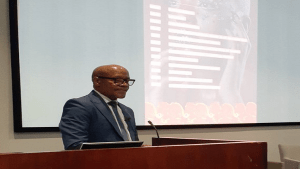Higher Education Minister Blade Nzimande says more than 60% of the students who benefited from the National Student Financial Aid Scheme (NSFAS) are also beneficiaries of the South African Social Security Agency (SASSA). The minister says this is a massive achievement.
Nzimande was briefing the Portfolio Committee on Higher Education of the National Assembly on some of the ongoing financial support to students at various tertiary institutions.
“It’s that 67% of the new applicants, honourable chair, are SASSA beneficiaries. You see what this means is that the child grant is working in such that kids that ordinarily would not have reached this stage, are able now to apply and many of them would be able to get to a university or college. It’s a huge achievement by the government; the impact of the other grant that we have which is the child grant,” says Nzimande.
Poor student funding scheme’
Nzimande had defended NSFAS amid some criticism of the poor student funding scheme. This comes amid student protests across the country over fees exclusions.
Kagisho Mamabolo on NSFAS funding system for the 2021 academic year:
Some observers say government also needs to do more to fund universities themselves. Nzimande says NSFAS has made great strides in achieving constitutional imperatives for everyone to receive education as a basic right.
“What is the nub of the problem that we are facing now? The nub of the problem that we are facing now is not NSFAS; it’s not government policy. Yes, there may be issues to those who appeal, those who may fall through the cracks here and there, but in general, NSFAS has achieved the government’s intention in terms of Section 21 of the Constitution. What we are facing now is why we are meeting with the vice-chancellors, which is why we are having student protests. Let’s go straight to the issue honourable chair, Honourable Papulane. The issue is student debt and who is owing. It’s student debt and the necessity and the demand for students who owe to register to be allowed to register.”
However, there have been accusations of mismanagement at NSFAS. The student aid scheme also received an audit disclaimer from the Auditor-General.
Accusations of mismanagement at NSFAS:
Historical debt
On Tuesday, Nzimande met with Vice-Chancellors from universities across the country to map a way forward as student protests continue.
Students from some tertiary institutions have been protesting calling for historical debt to be cancelled. They want all students to be allowed to register for the 2021 academic year.
Despite threats of a nationwide shutdown of tertiary institutions, the academic curriculum continued online at many universities and colleges.
The SA Union of Students has reiterated that all 26 universities must be completely shut until funding, historical debt and other issues are dealt with.
Discussion on student protests against financial exclusion:
In Gauteng, the management of Vaal University of Technology said they are currently locked in meetings with interim student representatives to resolve issues of registration and historical debt. They are expecting to resume with learning by next week.
However, Universities South Africa says if tertiary institutions have to foot the bill for the shortfall costs of NSFAS funding and historical debt, this will result in further financial woes for universities.
Universities South Africa CEO, Prof Ahmed Bawa, says tertiary institutions have resolved to cover the 2021 shortfall cost of NSFAS funding.
“The shortfall of funding for NSFAS has been resolved, although that will be at the expense of universities. The issue around student debt hasn’t been resolved. What we have decided, for this year, is that all 26 universities will use whatever instruments they have to try and address that issue. What we are doing is basically kicking the can down the road and adding to debt, if you like. The most recent figures is that debt has now ballooned to about R14bn. That means money that should have been invested in the functioning of the university is now not available to the universities.”
Exclusion of many students from NSFAS under the spotlight:






